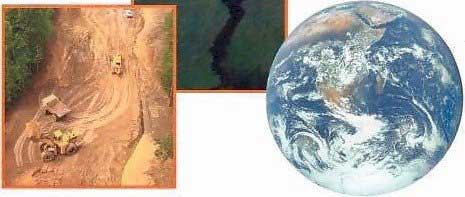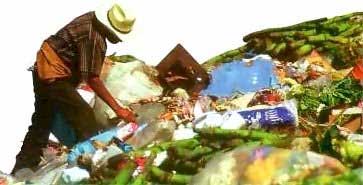|
| |
|
The ecology
has reached enormous importance
in the last years.
The increasing
interest of the man by the environment
in which it lives must fundamentally
to the conscience taking on
the problems that affect our
planet and demand a quick solution.
The alive
beings are in permanent interaction
between each other and with
the environment in which they
live. The ecology analyzes how
each element of an ecosystem
affects the other components
and how this is affected too.
It is a synthesis science, because
to understand the complex plot
of relations that exist in an
ecosystem it takes knowledge
from botany, zoology, physiology,
genetics and other disciplines
like the physics, chemistry
and geology.
In 1869, the
german biologist Ernst Haeckel
coined the term ecology, refering
to the Greek origin of the word
(oikos, house; logo, science,
study, treaty). According to
Haeckel, ecology had study species
in its biological relations
with environment. Other scientists
took care later of the surroundings
in which each species lives
and of its symbiotic and antagonistic
relations with others.
Towards 1925,
August Thienemann, Charles Elton
and others stimulated the ecology
of the communities. They worked
with concepts as the one of
food web, or the one of pyramid
of species, in which the number
of individuals diminishes progressively
from the base to the peak, the
plants to the herbívorous
animals and the carnivores.
 |
The
lack of green spaces, the
overpopulation, excess smoke
and the heat generated by
different machines, add
to acoustic and visual contamination
makes the city an adverse
atmosphere for the man. |
 |
|
|
New name for an old problem
Neither the problems that ecology
treats are new nor the ecology is
only one fleeting fashion.
Already in the Neolithic period,
ten thousand years back, the men destroyed
forests to obtain wood and also to
open clear where to sow the grains
on which they fed themselves. Thus
they were altered the ecosystems in
which those communities lived.
In Greece, Platon left written testimony
of the mountain deforestation of the
Ática, that had stayed as "the
skeleton of a body make thin by the
disease". The water, observed
the philosopher, "was not lost
then as it happens today, running
on the naked land".
Of course, the problem did not affect
only the Antiquity: throughout history
diverse terrestrial areas were modified
by the action of the man. For example,
as of the decade of the '50 agriculture
experienced a growth favoured by the
advances in genetic engineering of
seeds. This intensification of the
use of ground caused the degradation
of same and the necessity to operate
new areas.
|
 |
When
the human activity lacks controls
and regulations, great catastrophes
can take place. The petroleum
spills cause the death of numerous
organisms, altering the ecological
balance. |
|
 |
When
disappearing the forests not only
the capacity of renovation of
oxygen in the atmosphere is lost,
but that also the fertility of
the ground is reduced and its
erosion is increased. |
|
|
Vision of set
The Earth confronts
serious danger of contamination and
death of vegetal species and animals,
and also of grounds, the atmosphere,
the rivers and the seas, that sustain
life
Aware of the gravity
of the situation, the countries member
of the United Nations met in 1992,
in the Conference on "Environment
and Development", known as the
Summit of Rio de Janeiro. , Governors,
scientists and journalists there worldwide,
informed and alerted on the problems
of the industrial and technological
development.
The knowledge of
the nature and the cares that it requires
would be fundamental subjects in the
present educative processes. The educative
system, indeed, must provide information
on ecology at all the levels: from
the care of a domestic animal, passing
through daily chat with teachers or
the work in scholastic orchards in
all levels, since primary to the tertiary
specializations and the awareness
of the professionals of other areas
in institutes and universities.
|
 |
The
great amount of garbage that the
man generates, burns itself or
usually is used in sanitary fillings
to attenuate the impact that this
produce, the developed countries
foments the recycled one. |
|
| |
| The
lack of care on the part of the
man towards other alive beings
puts in danger of extinction to
many species, the bulging bear,
some batrachians, the seals of
the Arctic or the whales of the
seas of the south are some of
them. |
|
|
|
|
|
|

 cargando el contenido
cargando el contenido